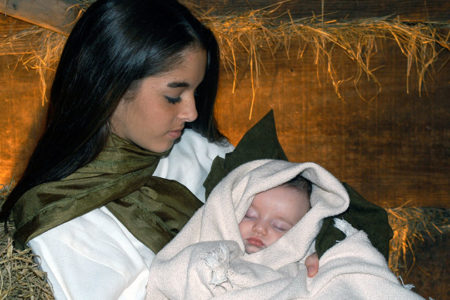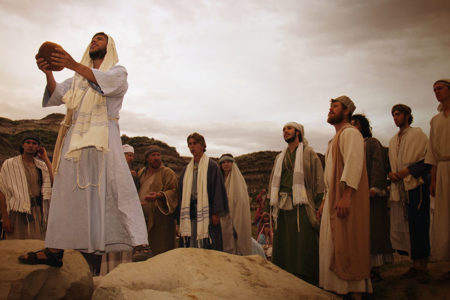A Lifestyle of Faith Hebrews 10:19–25
To this point, the book of Hebrews has been doctrinal in nature. Using comparison, the author has shown Christ’s superiority over angels, Moses, and the Levitical priesthood. He has also shown that Christ’s sacrifice on the cross was sufficient to remove sin and provide eternal life to all who believe.
Building on this knowledge, he then set forth the type of life each believer is to live—one of faith, hope, and love.
The Christian’s Faith
“Therefore, brethren, having boldness to enter the Holiest by the blood of Jesus, by a new and living way which He consecrated for us, through the veil, that is, His flesh ” (Heb. 10:19–20). The word therefore looks back to the doctrines taught about Christ in 1:1—10:18 and provides a transition into the practical applications and exhortations in the remaining chapters of the book.
The author addressed his readers as “brethren” (v. 19), indicating they were true believers in Jesus Christ; and he exhorted them to go directly into God’s presence with “boldness,” meaning freedom of speech and confidence to express their personal needs.
This authority has been granted to every believer on the basis of his or her relationship in Christ. Through His death, Jesus opened for the first time a new and living (life-giving) way for people to come into God’s presence (v. 20); “new” because no one could directly enter God’s presence under the Law of Moses, and “living” because the way provides life for believers and continual access to God.
Such access was accomplished through the “veil” of Christ’s “flesh” (v. 20). At the exact time of Jesus’ death on the cross, at the ninth hour (3 P.M., Mt. 27:45), the heavy Temple veil was rent in two. Hundreds of people were in the Temple area, as the priests were busy in the Temple preparing the evening sacrifice. Every eye there witnessed this event. Awe and amazement must have struck the priests as they heard and viewed the divine stroke of God tearing the huge veil in half from top to bottom. The empty room of the Holy of Holies stood wide open before them, as if bidding them to come in.
It was at this point that God proclaimed to the Jewish people (and the world) that the ministration of the Jewish priesthood had ended. No longer was a high priest needed to atone for sin annually. Through His atoning blood, Jesus, the true High Priest, had opened the way for mankind to come into God’s presence (Heb. 6:19; 9:3–15; 10:19).
The torn veil is a picture of the “torn” body of Christ, who made it possible for us to worship at the throne of God. The same hand that tore the veil in the Temple, from top to bottom, “tore” Jesus’ body on our behalf (Isa. 53:10). Although His sacrifice for our sins was (once and for all) offered almost 2,000 years ago, it never grows old but is always fresh and current for all who accept it. His shed blood is a continual fountain, cleansing all who appropriate it for their sin. It provides both a “new and life-giving way.”
Christ, who is the only way and life (Jn. 14:6), has made it possible for us to enter God’s presence through the “veil” of His flesh. The Temple veil closed off access to all but the high priest who could only pass through once a year. But now, through Jesus’ sacrifice, the passage is open to everyone who comes to God by faith in Christ. He changed the veil from a spiritual barrier to a spiritual gateway.
We are also invited to come into God’s presence because we have a “High Priest over the house of God” who bids us to come (Heb. 10:21). The original Greek text actually says “great Priest,” recalling the phrase great High Priest (4:14) and all that has been said about Christ’s exaltation at God’s right hand (10:12). Jesus Christ is more than a High Priest; He is the greatest High Priest in history over the actual house of God. No high priest in Israel was ever exalted to such a position.
For Christians, the rent veil means we have a great mediating High Priest who has opened the way for us to have access to the throne of God (1 Tim. 2:5). It also means that, as believer-priests, we can come into God’s presence at any time through Jesus Christ with the confidence that we will obtain mercy and find grace to help us in times of need. Since we have this high and holy privilege, we are exhorted to exercise it in four ways.
In a Proper Way. “Let us draw near with a true heart in full assurance of faith, having our hearts sprinkled from an evil conscience and our bodies washed with pure water” (Heb. 10:22). This verse reveals four conditions believers must meet before coming into God’s presence: We must come with (1) a true heart and (2) assurance, following (3) appropriate preparation and (4) cleansing.
A “true heart” means to come in purity and with truthful motives, gladness, openness of speech, and bold expectation of appropriating all the privileges we have as believer-priests.
“Full assurance of faith [conviction and certainty of faith]” means putting firm trust in God’s ability to provide what we ask of Him, without doubting. In other words, we continually are to come before God’s throne ready to appropriate an answer to our petition.
Third and fourth, we are to draw near, “having our hearts sprinkled from an evil conscience and our bodies washed with pure water.” These two concepts are to be understood in the light of the purification rituals required for the high priest on the Day of Atonement. He needed to be properly prepared before approaching God for both service and worship. The high priest had to shed animal blood at the brazen altar and wash his body at the laver before entering the Holy of Holies. Only then could he enter with a pure conscience.
Believer-priests must also experience cleansing—but through Christ’s blood, which frees them from an evil conscience of sin. This event takes place when we receive the Lord, wherein we are justified, or declared righteous once and for all, and finally freed from the guilt of sin.
The phrase bodies washed with pure water does not refer to water baptism, as many interpret it, but indicates a thoroughness of cleansing through the ongoing process of progressive sanctification after one has been redeemed. At salvation a believer is “washed” and then is progressively being washed through Christ’s Word throughout his or her pilgrimage on Earth. The same Greek word is used in the Septuagint for washing the priest for service (Ex. 29:4; Lev. 8:6).
The Christian’s Faithfulness
In a Careful Way. Second, we are exhorted to walk carefully before others: “Let us hold fast the confession of our hope without wavering, for He who promised is faithful” (Heb. 10:23). We must “hold fast” (with a tight grip) our confession of Christ, or our Christian commitment, to keep from slipping into sin, coldness of heart, or false doctrine.
Believers are not to waver or bend in their hope as Christians when faced with severe persecution. We must not rely on our own strength but on God’s strength through the Holy Spirit, who will give us the stability and immutability to remain strong and committed. The Lord is always near to provide what we need in order to stand. For He said, “I will never leave you nor forsake you” (13:5). God has promised He will not abandon us under any circumstance. Thus we can take great comfort and encouragement in God’s promises, which provide strength to stand with a consistent life before a world that opposes our faith.
The Christian’s Fellowship
With Concern for Others. Third, believers are exhorted to have a proper concern for other Christians. We are to encourage one another to live a life of commitment: “And let us consider one another in order to stir up love and good works” (10:24). The word consider means to be especially and continuously attentive to the welfare of other believers.
We are continuously to pay close attention to caring for the spiritual, moral, and physical welfare of fellow Christians and stir up, or stimulate, them to lives of love and good works in their walk before fellow believers and the world.
It is clear from this passage that Christians perform a major role in enabling fellow believers to manifest “love” and perform “good works.” This task is accomplished through Spirit-filled believers who stir one another to exercise the spiritual gifts given them by the Holy Spirit.
By Assembling With Others. Fourth, we are exhorted not to forsake assembling with other believers: “Not forsaking [abandon completely] the assembling of ourselves together, as is the manner [custom] of some, but exhorting one another, and so much the more as you see the Day approaching” (v. 25). This verse has both a negative and positive command.
Negatively, Christians may have abandoned the church because of persecution or because they falsely assumed Christ had delayed His return. Or perhaps they stopped attending in order to return to synagogue and Temple worship. Whatever the reason, they are told not to do so; such a departure would discredit their faith.
Many commentators say the words the Day refer to Christ’s Second Coming, and that well could be. But an argument can be made that the words refer to the coming judgment that would soon fall on Israel when Rome destroyed Herod’s Temple and scattered the nation in A.D. 70. Jesus referred to this judgment numerous times near the end of His ministry (Mt. 24:1–2; Lk. 19:41–44; 21:20–24).
Positively, no matter what the conditions might be, believers are to stick with the local church. They are to exhort one another to continue attending faithfully as they “see the Day approaching.”
Because of our position in Christ, we have the great and glorious privilege of approaching God directly. This awesome opportunity is not to be taken lightly; it should produce humbleness, a renewed commitment to Christ, and a heart full of praise for what God has granted to us. Come, surrender all, and give Christ the adoration and worship due Him.






